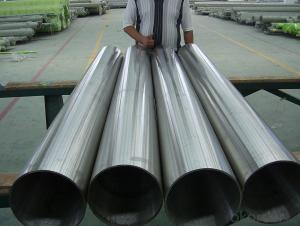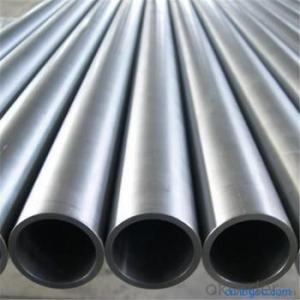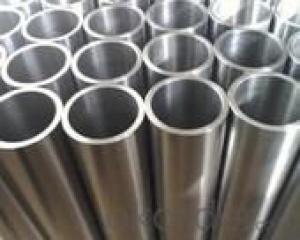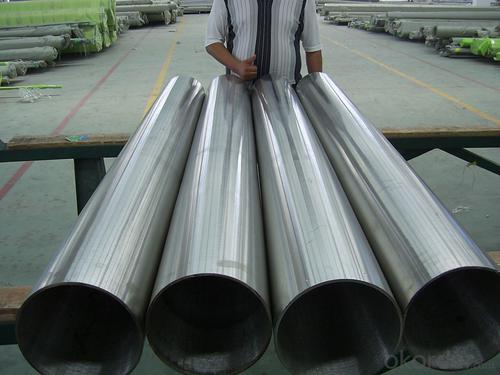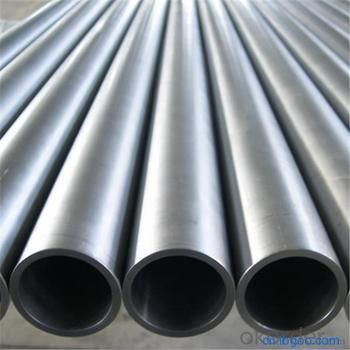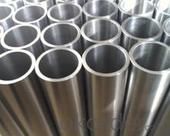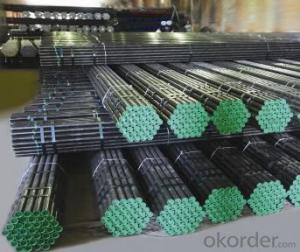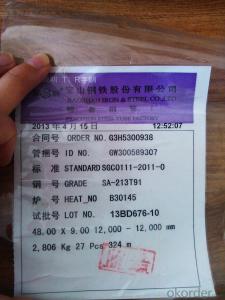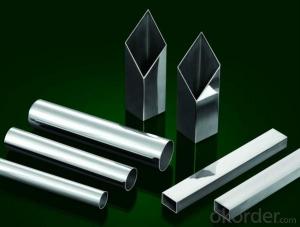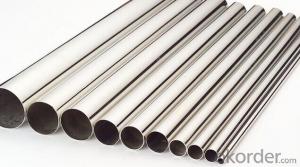ASTM A213 T91 boiler tube 2321
- Loading Port:
- Shanghai
- Payment Terms:
- TT OR LC
- Min Order Qty:
- -
- Supply Capability:
- 30000 kg/month
OKorder Service Pledge
OKorder Financial Service
You Might Also Like
Alloy pipe stock grade A335P11/P22/P12/P91/P92/P9/P5 A213 T11/T22/T12/T91/T91/T9/T5
T91 alloy pipe is America national tree like ridge and America combustion new martensitic heat-resistant steel engineering company metallurgical materials laboratory research work. It is to reduce the carbon content of 9Cr1MoV steel on the basis of the content of sulphur, phosphorus, strictly limit the vanadium, niobium, adding small amount of alloying elements.
The number of K90901 T91 alloy tube
T91 alloy tube
T91 alloy pipe specifications: 8-1240 x 1-200mm
Overview of T91 alloy tube:
T91 alloy tubes for ferrite and Olympic alloy steel seamless steel tube boiler, overheating and heat exchanger belongs to (ASTM A213 / A213M-07a)
Use:
For low and medium pressure boiler (work pressure is generally not more than 5.88Mpa, the operating temperature at 450 DEG C) of the heating surface tube; used for high pressure boiler (work pressure is generally above 9.8Mpa, operate at a temperature of 450 DEG to 650 DEG C between) the heating surface tubes, economizer, superheater, reheater, petrochemical industrial pipe.
Heat treatment of T91 alloy tube:
The final heat of T91 treatment for normalizing and high temperature tempering, normalizing temperature 1040 C, the holding time of not less than 10 min, the tempering temperature is 730 to 780 DEG C, the heat preservation time is not less than 1h, the final heat treatment on Microstructure of tempered martensite
- Q: Can steel pipes be used for brewery installations?
- Indeed, brewery installations can utilize steel pipes. Within breweries, steel pipes are frequently employed for a multitude of purposes, including fluid transfer, equipment interconnection, and plumbing system establishment. Steel pipes boast exceptional durability, strength, and resistance to corrosion, rendering them apt for handling the challenging conditions and high-pressure environments typically encountered in brewery installations. Moreover, the ability to weld steel pipes together enables seamless connections, guaranteeing a dependable and leakage-free operation. Nevertheless, it remains crucial to ensure that the steel pipes employed in brewery installations comply with the requisite standards and regulations, thereby safeguarding the safety and quality of the beer production process.
- Q: How are steel pipes coated for protection?
- Steel pipes are commonly coated for protection through a process called galvanization. This involves immersing the pipes in a bath of molten zinc, creating a protective layer that prevents corrosion and extends their lifespan. Additionally, other methods such as epoxy coatings or polyethylene wrappings can be used to provide additional protection against external factors.
- Q: How are steel pipes used in the manufacturing industry?
- Steel pipes are used in the manufacturing industry for a wide range of applications, including the transportation of fluids and gases, structural support in buildings and infrastructure, and as a material for heat exchangers and boilers. They are also utilized in the production of various machinery and equipment, such as conveyors, cranes, and industrial piping systems. Overall, steel pipes play a crucial role in ensuring efficient and reliable operations across numerous manufacturing processes.
- Q: Are steel pipes suitable for underground drainage systems?
- Yes, steel pipes are suitable for underground drainage systems. Steel pipes have several qualities that make them a popular choice for underground drainage. Firstly, steel pipes are strong and durable, capable of withstanding high pressure and heavy loads. They are resistant to corrosion and can last for many years without the need for frequent maintenance or replacement. Steel pipes also have the advantage of being versatile and adaptable to different soil conditions. They can be easily customized to fit the specific needs of the drainage system, including varying diameters and lengths. Additionally, steel pipes can be welded together, ensuring a tight and secure connection that prevents leakage and the infiltration of groundwater. Another benefit of steel pipes in underground drainage systems is their ability to handle a wide range of temperatures. They are resistant to extreme heat or cold, making them suitable for various climates and environments. However, it is important to note that steel pipes can be more expensive than alternative materials like PVC or HDPE pipes. Additionally, they can be heavier and more difficult to install, requiring specialized equipment and expertise. Overall, steel pipes are a reliable and long-lasting option for underground drainage systems, particularly in areas where durability and strength are important considerations.
- Q: Can steel pipes be used for mining applications?
- Yes, steel pipes can be used for mining applications. Steel pipes are known for their strength, durability, and resistance to extreme conditions, making them suitable for various mining activities such as transporting water, air, or chemicals, as well as for structural support and ventilation systems in mines.
- Q: Can steel pipes be used for sewage and wastewater systems?
- Yes, steel pipes can be used for sewage and wastewater systems. Steel pipes are highly durable, resistant to corrosion, and can withstand high pressure and temperature conditions, making them suitable for transporting sewage and wastewater efficiently and securely. Additionally, steel pipes have a long lifespan and can handle the abrasive nature of sewage and wastewater, making them a reliable choice for such systems.
- Q: Can steel pipes be used for conveying slurries or abrasive materials?
- Yes, steel pipes can be used for conveying slurries or abrasive materials. Steel pipes are known for their strength and durability, making them suitable for handling heavy-duty applications. They are resistant to wear, corrosion, and impact, which makes them ideal for conveying abrasive materials or slurries that contain solids or particles. Additionally, steel pipes can withstand high pressure and maintain their structural integrity, ensuring the safe and efficient transportation of slurries or abrasive materials.
- Q: Can steel pipes be used for hydropower generation?
- Yes, steel pipes can be used for hydropower generation. Steel pipes are often used in the construction of hydroelectric power plants to transport water from a higher elevation to lower areas, where the water's kinetic energy is converted into mechanical energy to generate electricity. The durability and strength of steel pipes make them suitable for this purpose, as they can withstand the high pressure and flow rates of water in hydropower systems.
- Q: What are the environmental impacts of using steel pipes?
- The environmental impacts of using steel pipes include the extraction and processing of raw materials, such as iron ore and coal, which contribute to deforestation, habitat destruction, and greenhouse gas emissions. The manufacturing process also generates significant amounts of waste, including slag and emissions from steel production. The transportation and installation of steel pipes contribute to carbon emissions, while their corrosion and maintenance may result in the release of toxic substances into the environment. Proper waste management and implementing sustainable practices can help mitigate some of these impacts.
- Q: What are the common sizes of steel pipe fittings?
- The common sizes of steel pipe fittings range from 1/8 inch to 24 inches in diameter.
Send your message to us
ASTM A213 T91 boiler tube 2321
- Loading Port:
- Shanghai
- Payment Terms:
- TT OR LC
- Min Order Qty:
- -
- Supply Capability:
- 30000 kg/month
OKorder Service Pledge
OKorder Financial Service
Similar products
Hot products
Hot Searches
Related keywords
